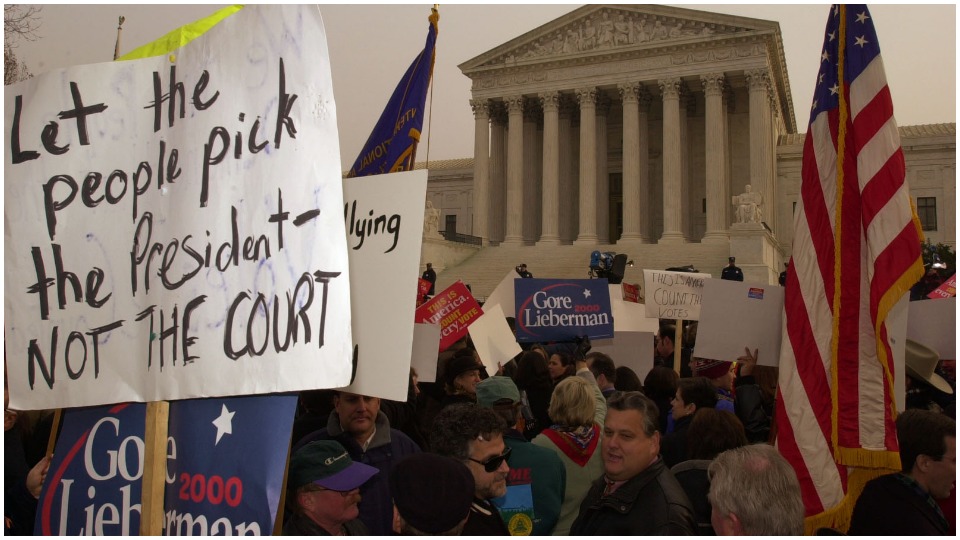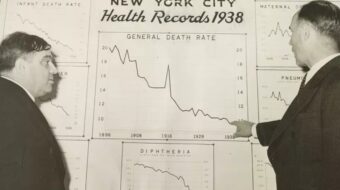
The reality that the courts will decide whether or not the ballots of millions of voters will be counted this November 3 is evident. Donald Trump and the entire Republican Party are laying the groundwork now to hold onto power by whatever means necessary—the will of voters be damned.
Legal teams are being assembled and court challenges prepared, some already filed, in states across the country should they be needed to stop vote counts, recounts, or dispute results. It’s no exaggeration to say that a legal coup is brewing if the election doesn’t end up going to Trump and the GOP.
With Trump’s packing of the courts with conservative judges and his determination to ram through a new far-right Supreme Court justice before Election Day, Republicans face a judicial battleground favorable to them in far too many places.

The last time Republicans pulled this off was in the 2000 election when the courts handed the presidency to George W. Bush over Al Gore. That subversion of democracy didn’t come at the point of a gun or with jack-booted thugs storming the capitol. It came in lawyers’ suits and justices’ robes.
When the far right couldn’t win a fair election by the majority votes of the American people, they stole it through the courts. The GOP is planning to do it again. And this time, the consequences could be even worse.
Contempt for democracy
Four years under a Donald J. Trump presidency have seen a major transformation of the executive branch—trading political influence for private sector favors, side-stepping Congress to install unqualified individuals as “acting” officials—and the weaponization of the Dept. of Justice under Attorney General Bill Barr, who serves as Trump’s legal tool and personal attorney.
As if the flagrant abuse of executive power and the mismanagement of the global coronavirus pandemic were not enough, the occupant of the White House is now threatening the integrity of the very act of casting a ballot. With the U.S. still grappling with the coronavirus, at least a third of voters, maybe more, are expected to cast their ballot by mail.
It’s a small action, but it is one that’s quite terrifying for the Republican Party. Why? Because making voting more accessible will likely lead to more votes cast for Democratic candidates.
In truth, mail-in-voting allows individuals (most often Black and Latino voters) typically disenfranchised through politically motivated measures like shutting down or restricting the number of polling places to participate in the electoral process. Postal voting allows people in poor and working-class neighborhoods to get their ballots in regardless of the artificially long polling place lines often engineered by Republican election officials.
Like gerrymandered redistricting, the targeted purging of voter rolls, and modern-day poll taxes, the goal of such sabotage is to steal people’s right to vote.
These often disenfranchised voters are more than likely to vote and lean left, which has got Republicans worried about losing. Democrats and left activists, meanwhile, worry about massive voter suppression by Republicans. Despite an advertising blitz by Trump’s Postmaster Louis DeJoy claiming everything will go smoothly on Election Day, reports suggest the United States Postal Service is concerned about its ability to handle the surge of ballots—especially after the destruction of mail sorting machinery.
At the center of the chaos engulfing the integrity of the vote is Donald Trump, who casts doubts over a free and fair election by using the Supreme Court and lower courts’ shadow docket (emergency orders and summary decisions that are outside the high court’s principal docket of argued cases and decisions) to secure legal wins for his re-election, while expertly providing the public with a consistent stream of voting misinformation: “Mail-in ballots substantially increases the risk of crime and VOTER FRAUD!”
Of course, there is no evidence that any of his “fraud” claims are true. And of the minuscule cases of voter fraud documented, most tend to be localized and not tilted toward Democrats—2018 saw North Carolina Republicans cited for election fraud.
All the while, the margin of victory for Biden narrows as we inch towards Nov. 3. Trump keeps sowing the seeds of division and partisan polarization through social media. He works to leverage general public distrust of government and news media to his advantage.
The likelihood of a disputed election is a real possibility and if so, it would mark the fifth time in U.S. history a president was elected without voters (technically).
Both parties know this and both have likely developed some cunning strategy stemming from the outcome of the 2000 U.S. presidential election in the event the ultimate decision this year falls back into the hands of black-robed jurists seated within the high court.
Gore v Bush – 2000
Truth can be stranger than fiction. And the sudden twists, turns, and overall bitterness that characterized the Y2K presidential election year is perhaps only matched by the current election cycle. Democrat Al Gore and Republican George W. Bush differed on many of the issues confronting today’s candidates, but there was no global pandemic, nor a fractured economy, nor the same level of extreme partisanship within voting blocs to contend with at the time.
Regardless, a razor-thin margin was all that separated the two candidates as Election Day 2000 neared. On the evening of Nov. 7, 2000, as Americans gathered around their television sets, and weary campaign staffers brought out their well-earned six-packs, what they found was television networks declaring Gore the winner of Florida and thus the presidency, then quickly “correcting” themselves to give Bush the win, leading to a rushed concession call by Gore, which he took back an hour later.
Mistakes and schemes unfolding throughout election night and beyond led to a 36-day political and legal battle on how to resolve a tie for the presidency. So what went wrong in Florida?
On election night, the preliminary vote tally in Florida showed Bush winning by about 1,700 votes, and with the state’s 25 electoral votes up for the taking, the winner would become the next president. But that initial vote count was less than a 0.5 percent difference, forcing an automatic machine recount. The first recount left Bush with only a 317-vote lead over Gore. Gore, therefore, asked for a manual recount as allowed by Florida law. Over the coming weeks, Democrats and state officials fought over election deadlines and pushed for deadline extensions.
The arguments used by the Gore camp for a recount ranged from confusion on the part of voters due to misaligned ballot columns, unclear ballot markings (butterfly ballots), ballots not being punched through all the way (hanging chads), and a general difficulty within the election process—many inner cities and lower-income neighborhoods were left with antiquated voting machines and processes.
The counting continued. Time dragged on.
By Nov. 26, 2000, Florida Sec. of State Katherine Harris, who worked for Bush’s brother, Gov. Jeb Bush, certified Bush as the winner by a recounted 537 vote margin. Gore filed suit with the Florida Supreme Court. The recounts had not yet been completed when Harris shut down the whole process and certified the results.
The Florida Supreme Court sided with Gore, Dec. 8, 2000, ordering that all statewide “undervote” ballots or punch-card ballots that had been cast but not registered because of a problem called a “hanging chad” needed to be recounted.
Bush’s team went immediately to the U.S. Supreme Court which ordered a pause in the recount on Dec. 9, 2000, until oral arguments in the case.
The political question before the court was: Did the Florida Supreme Court violate Article II Section 1 Clause 2 of the U.S. Constitution by making new election law? Do standardless manual recounts violate the Equal Protection and Due Process Clauses of the Constitution?
Faced with a legal deadline under federal law (3 U.S. Code § 5), “the safe harbor provision,” a state must determine its electors six days before the Electoral College members meet in person. In 2000, that deadline was Dec. 12. Arguments were scheduled for Dec. 11, giving the high court one day to decide.
On Dec. 12, 2000, the Supreme Court made one of the most controversial decisions in an unsigned per curiam main decision, with concurrences and dissents written by individual justices.
The Supreme Court’s ruling went against the Florida Supreme Court, sending the case back to it for further action. But since the safe-harbor deadline had passed, Bush remained as the certified winner in Florida, and Gore conceded the next day.
This entire fiasco pushed the boundaries on the “Political Question Doctrine,” a position where federal courts will “refuse to hear a case if they find that it presents a political question.” The doctrine refers to the idea that issues which are very politically charged should not be heard by federal courts, which are supposed to maintain themselves as the “apolitical” branch of government.
Historically, the Supreme Court has chosen to apply this doctrine to issues related to the Executive Branch rather than the Legislative Branch, but this changed in 2000. And while it may seem to be a subtle change, it has further politicized the Supreme Court and set a precedent for the 2020 election if the results are similarly in dispute.
It also leaves the incumbent president more likely to make lifetime appointments to the bench not on legal merit and unbiased political character but rather based on ideological loyalty or political expediency—which Trump explicitly says he will do in the case of filling the Ginsburg vacancy.
Two years into his first term, Bush signed the “Help America Vote Act” with the intended goals of replacing punch card and lever-based voting systems, creating the Election Assistance Commission to assist in the administration of federal elections and establish minimum election administration standards.

The only problem? All EAC commissioners are chosen by the president and confirmed by the Senate—thus creating another body subject to the vagaries of political loyalty and manipulation.
Biden v Trump – 2020
Twenty years have passed since that electoral moment rocked faith in the U.S. Constitution, and another controversial and bitter election year is drumming up echoes from the past. The candidates are not just waging an electoral war on the campaign trail; they are doing so inside courtrooms nationwide.
As efforts to alter voting procedures during the coronavirus pandemic increase, a barrage of legal challenges has followed. As of Sept. 20, 2020, there are some 250 cases in 45 states, D.C., and Puerto Rico. All of them deal with early voting, absentee voting, or mail-in-ballots.
Trump makes no secret that he, and the Republican National Committee, will do whatever it takes to derail alternative voting procedures.
“SEE YOU IN COURT, THE SECURITY OF OUR NATION IS AT STAKE!” tweeted Trump last month after the Nevada Legislature approved sending out mail-in-ballots to all active registered voters. He followed through and sued the state.
So far, the Trump campaign and RNC have set aside $20 million for litigating this election, and they are upping their ground game by seeking to get 50,000 volunteers to “monitor” polling places in battleground states (something many say amounts to voter intimidation). On the “Army for Trump” website, there’s even a convenient way to report so-called “election incidents.”
During a recent reporters’ call with the Elections Assistance Committee, concerns were raised about encouraging voting in person. EAC Commissioner Christy McCormick initially recommended voting in person, despite the coronavirus risk, and it was unclear whether that was a personal view or the view of the EAC.
On a clarification follow-up question, McCormick said: “It’s actually my personal view. I think the EAC pushes, and I actually do as well, that voters need options this year. Everybody has a different risk level, but as we’ve seen with the problems with the primaries and ballot rejection rates, I think if you want to have your ballot counted, you’re much more likely to have so if you vote in person. And that’s just a reality.”
While it is true there were some issues with primary elections this year, for obvious reasons, the blurring between personal opinion and official positions is troubling.
On the other side, Biden has also prepared his campaign for costly litigation. The campaign says its legal war room will work to ensure that elections are properly administered and votes correctly counted. It will also fight voter suppression at the polls, identify foreign interference and misinformation, and educate voters on the different methods available for casting ballots.
“Notwithstanding Donald Trump and his Republican allies’ hollow threats and constant misinformation, election officials around the country are working tirelessly to hold a free and fair election, and we have an extraordinary national team in place to ensure that every eligible voter is able to exercise their right to vote and have their vote counted,” Bob Bauer, a senior adviser to the Biden campaign and former White House counsel to President Barack Obama, said in a statement.

Rerun?
So, what does it all mean?
The challenges to sabotage and disrupt mail-in voting are already well underway. They take the form of limiting voting options, ripping up postal boxes, crippling mail sorting facilities, purging voter rolls, and shuttering polling places. But as we see in the courts, Republicans are using the courts to the dirty work of voter suppression.
It is no guarantee that all votes will get counted, especially if the results are close and disputes go to the courts. In 2000, the Supreme Court helped block the counting of votes and handed the White House to Bush, who left office eight years later with two wars raging and an economy in freefall (a collapse only surpassed since by the Trump-COVID depression).
It could happen again, and if necessary, the GOP will show no hesitation to subvert democracy using the courts as a weapon. And compared to 2000, we have a court system that has been packed with conservative judges by Trump. With the death of Associate Justice Ruth Bader Ginsburg, the extreme right will have an even tighter lock on the Supreme Court, leaving all three branches of government in the hands of a single party.
Now, more than ever we need to vote—and fight to make sure our votes are counted.
Like free stuff? So do we. Here at People’s World, we believe strongly in the mission of keeping the labor and democratic movements informed so they are prepared for the struggle. But we need your help. While our content is free for readers (something we are proud of) it takes money — a lot of it — to produce and cover the stories you see in our pages. Only you, our readers and supporters, can keep us going. Only you can make sure we keep the news that matters free of paywalls and advertisements. If you enjoy reading People’s World and the stories we bring you, support our work by becoming a $5 monthly sustainer today.












Comments